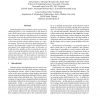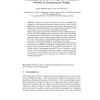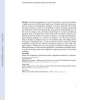1676 search results - page 75 / 336 » Formal Development of Self-organising Systems |
FM
2005
Springer
15 years 3 months ago
2005
Springer
The Mondex Electronic Purse system [18] is an outstanding example of formal refinement techniques applied to a genuine industrial scale application, and notably, was the first ve...
ISORC
2007
IEEE
15 years 4 months ago
2007
IEEE
Developing fault tolerant ambient systems requires many challenging factors to be considered due to the nature of such systems, which tend to contain a lot of mobile elements that...
FM
1999
Springer
15 years 2 months ago
1999
Springer
Support for system speci cation in terms of modelling and simulation environments has become a common practice in safety-critical applications. Also, a current trend is the automat...
LISP
2008
14 years 9 months ago
2008
The Ambient Calculus was developed by Cardelli and Gordon as a formal framework to study issues of mobility and migrant code. Numerous analyses have been developed for numerous va...
CORR
2008
Springer
14 years 10 months ago
2008
Springer
Synchronous languages rely on formal methods to ease the development of applications in an efficient and reusable way. Formal methods have been advocated as a means of increasing t...



